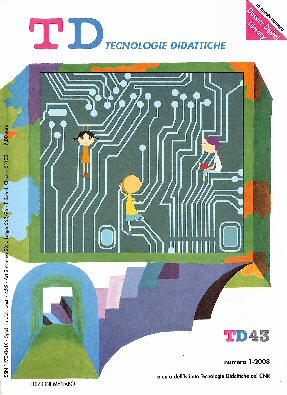La digital literacy nella scuola: l'esperienza norvegese
Contenuto principale dell'articolo
Abstract
Dettagli dell'articolo
Sezione
Gli autori che pubblicano su questa rivista accettano le seguenti condizioni:
- Gli autori mantengono i diritti sulla loro opera e cedono alla rivista il diritto di prima pubblicazione dell'opera, contemporaneamente licenziata sotto una Licenza Creative Commons CC BY 4.0 Attribution 4.0 International License.
- Gli autori possono aderire ad altri accordi di licenza non esclusiva per la distribuzione della versione dell'opera pubblicata (es. depositarla in un archivio istituzionale o pubblicarla in una monografia), a patto di indicare che la prima pubblicazione è avvenuta su questa rivista.
- Gli autori possono diffondere la loro opera online (es. in repository istituzionali o nel loro sito web) prima e durante il processo di submission, poiché può portare a scambi produttivi e aumentare le citazioni dell'opera pubblicata (Vedi The effect of Open Access).
Riferimenti bibliografici
Ainley J., Fraillon, J., Freeman C. e Mendelovits J. (2006), Assessing information and communication technology literacy in schools, Paper presented at the Annual Meeting of the American Educational Research Association, San Francisco, April 2006.
Barton D. (1994), Literacy. An introduction to the ecology of written language, Blackwell, Oxford.
Bereiter C. (2002), Education and mind in the Knowledge Age, Lawrence Erlbaum, New Jersey.
Bransford J.D., Brown A.L. e Cocking R. (2000), How people learn. Brain, mind, experience and School, National Academy press, Washington, D.C.
Buckingham D. (2003), Media education. Learning, literacy and contemporary culture. Polity Press; Cambridge.
Cole M. e Keyssar H. (1985), The concept of literacy in print and film, In Olson, Torrance e Hildyard (eds.) Literacy, language and learning. The nature and consequences of reading and writing, Cambridge University Press, Cambridge, Mass.
Cope B., Kalantzis M. (2000), Multiliteracies. Literacy learning and the design of social futures, Routledge, London.
Educational Testing Service (ETS) Digital Transformation. A Framework for ICT Literacy. Consultazione 30 agosto 2007, http://www.ets.org/ Media/Research/pdf/ ICTREPORT.pdf
Erstad O. (2004), PILOTer for skoleutvikling (PILOTs for school development), UniPub. Report no. 28. ITU, University of Oslo.
Erstad O. (2005), Digital kompetanse i skolen (Digital literacy in the school), University Press, Oslo.
Erstad O., Kløvstad V., Kristiansen T. e Søby M. (2005), ITU Monitor 2005 - På vei mot digital kompetanse igrunnopplæringen. (ITU Monitor 2005 - On the way towards digital literacy in basic education.), University Press, Oslo.
European Commission (2004), Key Competences for Lifelong Learning: a European Reference Framework, Directorate- General for Education and Culture. http://europa.eu.int/comm/ education/policies/2010/doc /basicframe.pdf.
Kubey R. (ed.) (1997), Media literacy in the information age, Transaction Pub, New Brunswick.
Lankshear C. (1997), Changing literacies, Open University Press, Buckingham.
Livingstone S. (2002), Young people and new media, SAGE, London.
National Research Council (NRC), Committee on Information Technology Literacy (1999), Being Fluent with Information Technology, National Academy Press, Washington, D.C.
Pahl, K. e Rowsell, J. (2005) Literacy and Education: Understanding the New Literacy Studies in the Classroom, SAGE, London.
Qvortrup L. (2001), Det lærende samfund. Hyperkompleksitet og viden, (The Learning Society. Hypercomplexity and knowledge.), Gyldendal, Copenhagen.
Säljö R. (2000), Lärande i praktiken. Et sociokulturellt perspektiv (Learning in practice. A sociocultural perspective), Proceedings of the 3rd International workshop on Digital Literacy, Prisma förlag, Stockholm.Scribner S.,Cole M. (1981), The psychology of Literacy, Harvard University Press, Cambridge, Mass.
Street B. (1984), Literacy in theory and practice, Cambridge University Press, Cambridge, UK.
Snyder I. (ed.) (2002), Silicon literacies. Communication, innovation and education in the electronic age, Routledge, London.
Tyner K. (1998), Literacy in a digital world. Teaching and learning in the age of information, Lawrence Erlbaum, New Jersey.
Vygotsky L. (1978), Mind in society, Harvard University Press, Cambridge, Mass.
Warschauer M. (1999), Electronic literacies. Language, culture and power in online education, Lawrence Erlbaum Associates.
Wells G., Claxton G. (eds.) (2002), Learning for Life in the 21st Century, Blackwell, Oxford, UK.
Wertsch J. (1998), Mind as action, Oxford University Press, Oxford.
White Paper (2004), Culture for learning, Ministry of Education and Research, Oslo.
Østerud S. (2004), Utdanning for informasjonssamfunnet. Den tredje vei (Education for the information society. The third way.) Universitetsforlaget, Oslo.

